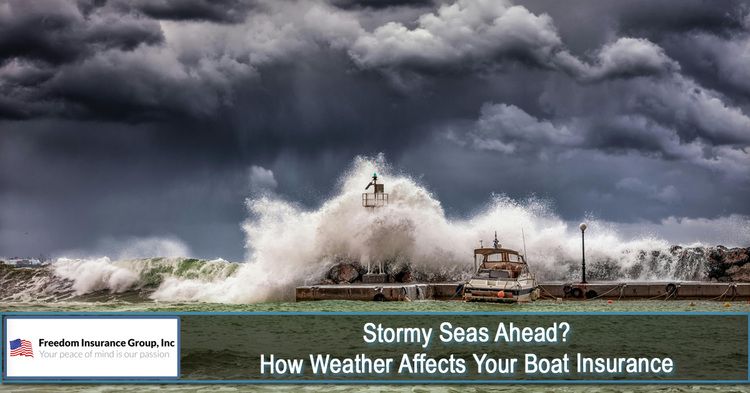
Owning a boat opens the door to endless adventures on the water—but it also comes with risks, especially when the weather turns foul. From sudden thunderstorms to hurricanes and hailstorms, weather events can significantly impact your boating experience and your insurance coverage.
Understanding how different weather conditions affect your boat insurance policy can help you avoid costly surprises and ensure smooth sailing—even when the forecast doesn’t cooperate.
Why Weather Matters in Boat Insurance
Weather is one of the primary risk factors considered by boat insurance providers. Unlike cars or homes that are typically stationary or garaged, boats are exposed to the elements—often left in the water or at marinas vulnerable to storms and flooding.
Here’s why insurers care about weather risk:
- Increased claim frequency during storm seasons
- Higher risk of sinking, fire, or impact damage during extreme weather
- Cost of emergency services (like towing or salvage operations) after weather-related incidents
- Risk of total loss, especially with hurricanes or tornados
As a result, insurers may adjust your premiums, coverage terms, or deductibles based on weather patterns in your area.
Types of Weather That Affect Boat Insurance
1. Hurricanes and Tropical Storms
- May require named storm deductibles, which are typically higher than standard deductibles.
- Some policies exclude coverage if proper precautions (like dry docking or moving inland) aren't taken.
2. Flooding and Storm Surge
- Damage from rising water may not be fully covered under basic boat insurance unless you’ve added specific protection.
- Marina or dock damage caused by surge may also affect your claim.
3. Lightning Strikes
- Can cause fires, electronics failure, or even hull damage.
- Most comprehensive policies include lightning coverage—but check if your electronics are covered separately.
4. Hail and Windstorms
- These can damage the boat's hull, windshield, or canvas.
- Some policies may limit hail coverage depending on location or require special endorsements.
5. Freezing Conditions
- Not technically “storms,” but cold weather can cause burst pipes and engine damage.
- Many policies exclude freeze damage unless the boat is properly winterized.
How Weather Risk Can Affect Your Policy
- Higher Premiums in High-Risk Areas
Live in Florida, the Gulf Coast, or another hurricane-prone zone? Expect to pay more for coverage.
- Coverage Restrictions During Storm Warnings
Some policies restrict coverage when tropical storm warnings are in effect.
- Docking Requirements
Insurers may require boats to be removed from the water during certain months or stored in approved locations.
- Exclusions for Negligence
If you fail to follow weather-related guidelines in your policy—such as securing your vessel or ignoring storm protocols—your claim may be denied.
Tips to Stay Covered and Prepared
- Read your policy carefully, especially the storm-related clauses.
- Add endorsements for towing, salvage, or electronics if needed.
- Document your storage plans (especially during storm season).
- Perform seasonal maintenance and winterization to prevent weather-related damage.
- Use storm tracking tools and alerts to stay informed during hurricane season.
- Talk to your agent about specific risks in your region and what coverage gaps you may have.
Final Thoughts
Weather is unpredictable—but your insurance coverage doesn’t have to be. With the right policy and preparation, you can protect your boat and your wallet from the high costs of weather damage. Don't wait until a storm is on the horizon—review your policy today and sail with confidence.
“Smooth seas don’t make skilled sailors, but smart coverage helps you weather any storm.”
At Freedom Insurance Group, Inc., we aim to provide comprehensive insurance policies that make your life easier. We want to help you get insurance that fits your needs. You can get additional information about our products and services by calling our agency at 828-322-7474. Get a free quote today by CLICKING HERE.
Disclaimer: The information presented in this blog is intended for informational purposes only and should not be considered as professional advice. It is crucial to consult with a qualified insurance agent or professional for personalized advice tailored to your specific circumstances. They can provide expert guidance and help you make informed decisions regarding your insurance needs.
